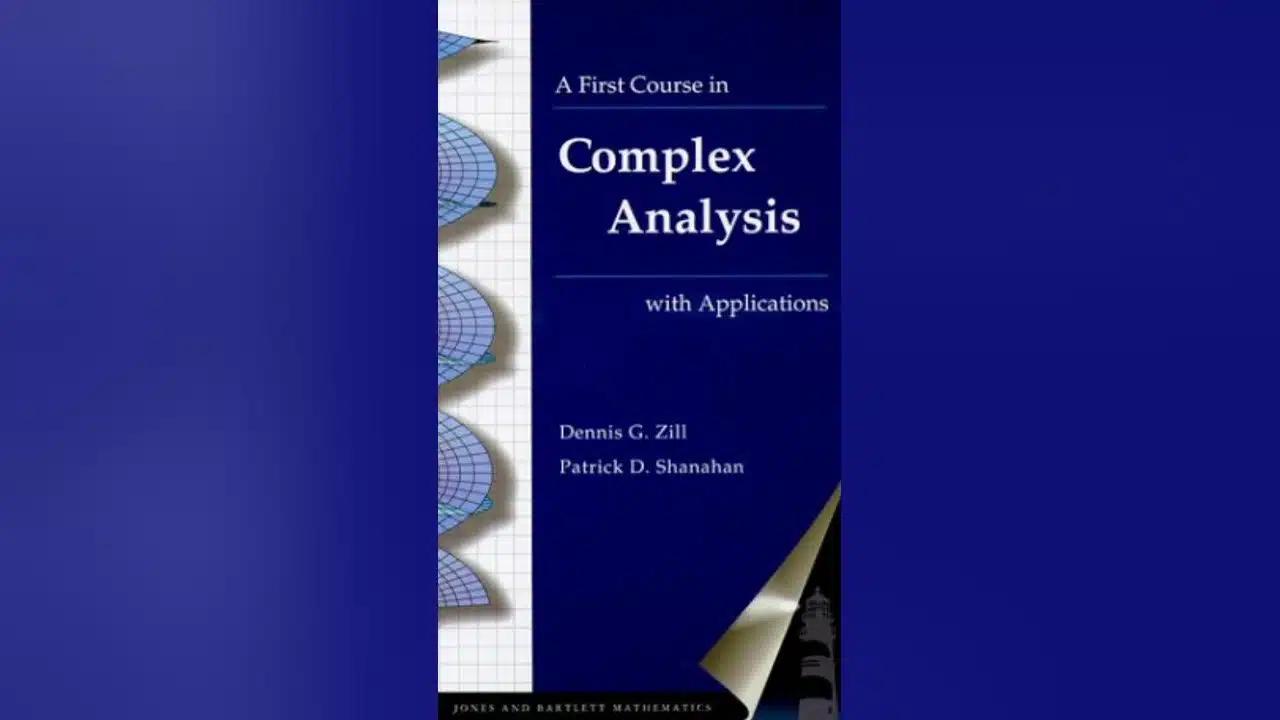Complex analysis is a key branch of mathematical analysis. It studies functions of a complex variable. It is crucial in engineering, physics, and applied math. Anyone seeking to explore this subject must have the right resources. A good book can clarify, explain, and guide you. It can help with complex proofs and theorems. This article will explore the best books on complex analysis. They suit learners at different levels.
10 Best Books for Complex Analysis
- “Complex Analysis” by Elias M. Stein and Rami Shakarchi
- “Principles of Mathematical Analysis” by Walter Rudin
- “Complex Variables and Applications” by James Ward Brown and Ruel V. Churchill
- “Visual Complex Analysis” by Tristan Needham
- “A First Course in Complex Analysis with Applications” by Dennis P. Murray
- “Complex Analysis: A Textbook” by Lars Ahlfors
- “Introduction to Complex Analysis” by H.A. Priestley
- “Fundamentals of Complex Analysis” by E.B. Saff and A.D. Snider
- “Complex Analysis for Mathematics and Engineering” by John H. Mathews and Russell W. Howell
- “The Theory of Functions of a Complex Variable” by E.C. Titchmarsh
“Complex Analysis” by Elias M. Stein and Rami Shakarchi
- Overview: This book is in the Princeton Lectures in Analysis series. It provides a rigorous but accessible introduction to complex analysis, covering the basics like Cauchy’s theorem and residue calculus. It then moves to advanced topics, such as the Riemann surface and functions. Alongside Best Astronomical Books, this book offers readers a deeper understanding of both the universe and mathematical theory.
- Why It’s Great: Stein and Shakarchi teach complex analysis well. Their method is both thorough and intuitive. The book has many examples and exercises. They help readers grasp the material. It is ideal for advanced undergraduates or graduate students.
“Principles of Mathematical Analysis” by Walter Rudin
- Overview: Often referred to as Baby Rudin, this book is a cornerstone in real and complex analysis. It doesn’t focus only on complex analysis. But, it gives a strong foundation in the principles of analysis. They are crucial for understanding complex variables. Rudin discusses topics like sequences and series, continuity, and differentiability in great detail.
- Why It’s Great: This book is a top, tough, and detailed analysis. It’s perfect for students with a calculus background. They want to study complex analysis as part of a broader study in mathematical analysis.
“Complex Variables and Applications” by James Ward Brown and Ruel V. Churchill
- Overview: This book is a top textbook for learning complex analysis at the level. It is well-structured. It has clear explanations and many exercises. So, it is accessible to those with a basic understanding of calculus. It covers both theory and practice in complex analysis. It includes conformal mappings, series expansions, and the basics of complex integration.
- Why It’s Great: The book’s balanced approach suits both theory and practice. It is often used in university courses. It gives readers a solid foundation in complex analysis.
“Visual Complex Analysis” by Tristan Needham
- Overview: This book offers a visually oriented introduction to complex analysis. It aims to build geometric intuition for concepts like analytic functions, and singularities. The book highlights the geometry of complex analysis. It gives readers a unique view.
- Why It’s Great: Needham’s visuals help readers grasp complex analysis. Its diagrams and geometric explanations are great for visual learners. They help those wanting to know the “why” behind the theorems.
“A First Course in Complex Analysis with Applications” by Dennis P. Murray
- Overview: This is an intro to complex analysis, with a focus on applications. It covers the Cauchy-Riemann equations, residues, and conformal mappings. It also covers their practical uses in physics and engineering. The book is aimed at undergraduate students with some exposure to calculus.
- Why It’s Great: This book offers a practical take on complex analysis. It shows real-world uses in engineering and physics. It’s ideal for students who are looking to apply complex analysis concepts in various fields.
“Complex Analysis: A Textbook” by Lars Ahlfors
- Overview: Ahlfors’ book is a classic in complex analysis. It offers a detailed treatment of the subject. It covers the basics, like analytic functions, Cauchy’s theorem, and conformal mapping. It also covers advanced concepts, like Riemann surfaces and the Schwarz-Christoffel transformation.
- Why It’s Great: Ahlfors is known for his clear, concise style and thorough mathematical rigor. This book is ideal for advanced undergraduates and graduate students. It gives a formal understanding of complex analysis.
“Introduction to Complex Analysis” by H.A. Priestley
- Overview: This is a textbook for undergraduates. It clearly and systematically introduces complex analysis. It covers basics like the Cauchy-Riemann equations and contour integration. It emphasizes problem-solving.
- Why It’s Great: Priestley teaches complex analysis. He focuses on practical problem-solving. His approach is accessible. The book has many exercises and examples. It’s great for students new to the topic.
“Fundamentals of Complex Analysis” by E.B. Saff and A.D. Snider
- Overview: This book is widely used in undergraduate courses on complex analysis. It covers standard topics like analytic functions, Cauchy’s theorem, and residue calculus. It also introduces applications in physics and engineering.
- Why It’s Great: The book is known for its clear and approachable style. It has many examples and exercises. So, it’s great for students wanting a structured learning experience.
“Complex Analysis for Mathematics and Engineering” by John H. Mathews and Russell W. Howell
- Overview: This textbook is perfect for engineering and applied math students. It emphasizes using complex analysis in real-world situations. It covers both theory and application. It includes Laplace transforms, Fourier series, and their use in engineering and dynamics.
- Why It’s Great: It focuses on applications. So, it’s a great resource for students who want to know how complex analysis is used in real-world problems.
“The Theory of Functions of a Complex Variable” by E.C. Titchmarsh
- Overview: Titchmarsh’s book is a classic. It thoroughly covers the theory of complex variable functions. It covers power series, analytic continuation, and residue theory.
- Why It’s Great: The book takes a theoretical, advanced approach to complex analysis. It’s perfect for graduate students or anyone wanting to learn more.
Why Complex Analysis is Important?
Complex analysis is vital in many areas of math and science. It applies to fluid dynamics, quantum mechanics, and electrical engineering, among other fields. It offers powerful methods for solving real-world problems. These involve oscillations, wave behavior, and electromagnetic fields.
Key Areas of Application:
- Electrical Engineering: We use complex analysis to solve problems in circuit theory, control systems, and signal processing.
- Fluid Dynamics: Complex analysis helps solve fluid flow problems. It is useful in potential flow and aerodynamics.
- Quantum Mechanics: Complex analysis is key in quantum mechanics. It is vital in studying wave functions and solutions to Schrödinger’s equation.
- Applied Mathematics: Many applied mathematicians use complex analysis to solve differential equations. This is especially true in wave propagation and heat conduction.
Conclusion
Complex analysis is a thrilling, tough field of study. It provides tools to solve many problems in math and the physical sciences. If you’re a student or a professional, the above books are for you. They will help you learn about complex functions and their uses. These books, from intro texts to advanced theories, cater to all learning styles. Using these resources will help you master complex analysis. It is a beautiful and intricate field.

